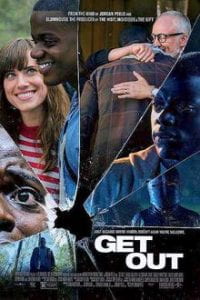Have you ever watched a modern horror movie? Nowadays, our society is continually being desensitized within the genre of horror, this means the industry needs to regularly come out with new and unique ideas to keep the viewers engaged. Get Out is an excellent example of a modern horror that tackles an unfamiliar perspective on fear. The film uses an array of storytelling techniques while addressing racism issues in our society.
Get out tackles a new take on horror, one that differs from the usual slasher film when the plot is somewhat expected. The film encompasses the feeling of isolation that slowly builds throughout the movie. The feeling starts off as soon as Chris, an African American man and his Caucasian girlfriend of 5 months Rose head to her parent’s house over the weekend. On the way the couple hits a dear, when the police come to report to the incident, the officer asks Chris for his driver’s licence even though he wasn’t the one driving. This sets the tone for the racism dynamic of this area, setting the tone that there probably aren’t a lot of black people living in that suburb. The house is located on a property far away from any other homes, “the nearest house is across the lake. Total privacy,” said Dean, the father of Rose. At first, in the movie, we might not think anything much of these little comments about the location or racially clumsy comments from Rose’s family and the other white people. However, they are a vital part of setting up the entire plot of the movie.
At night during one part of the movie, Chirs goes out to smoke and sees the black groundskeeper, Walter, running straight for him then, at the last minute he veers off to the side. Then he sees the Georgina, the black maid almost ghostlike it the window. Upon these weird events, he returns inside where Missy (Rose’s mum) convinces him to go into her office, where she can apparently cure his smoking. However, instead of curing Chris’s smoking, she takes him to the recollection of the night his mother died. This was an impactful part of the movie as it gives us a Chris’ backstory and really allows us to feel the emotion that he felt during that night. Missy then uses that feeling of weakness to send Chris into what she calls “The Sunken Place.”
“The Sunken Place” is a metaphor for all people who don’t feeling like their voices are heard. So many people can relate to this feeling from black people’s freedom, even to mental health illnesses. When Chris is put into “The Sunken Place,” it’s like he’s lost with no way out; he can see what’s happening on the outside, but no matter what Chris does, he cant be heard. These types of scenes in movies where the audience can connect and have empathy towards are the scenes that differ a film from being good to great. “The horror movies that stick with us are the ones that offer a unique twist on the character’s perspectives of the horror” (Get Out – A New Perspective on Horror)
The mental complexity aspect of “Get Out” is a crucial part of making the movie so compelling. We expect horror movies to be lots of blood and gore. The uneasiness we feel throughout the film is much more complex than the fear of the unbelievable or unknown. It’s a fear that is built within us about other people. For the majority of the film, we don’t see this type of horror, it’s not until the end. These aspects are encompassed at the end during the killing scene. Instead, through the depiction of the characters within the story, a deeper level of fear arises. The underlying concern of racism within our modern society. In NPR’s podcast interview with Jordan Peele about the ‘Human Horror’ of Racial fears, he said he wanted to show that “The fear that a black man has in a white suburb is real.” This is a crucial part of the creation of what makes the movie so terrifying, bringing the real-life fears that so many people in today’s society deal with to the screen. Another scare that Jordan Peele wanted to touch on in the creation of this movie was “the fear of meeting your future inlaws for the first time” (Peele). Having these layered aspects of fear within the story allows a significant number of people to relate to it, making the fear aspect so much more integrated into you when watching the movie.
Within this movie, the use of filmmaking and storytelling is very strong. As viewers, we follow Chris’ perspective throughout the majority of the movie. This is a very interesting view especially when the other characters begin to unfold. The specifics we learn about Chris unlock details about characters within the story. The other African American people who are the groundskeepers at the parents’ house seem to have something off about them. The way they interact with other people is not normal and almost seems as if they are under a spell or constantly in a daze.
The mental complexities within ‘Get Out’ correlate to the buildup of horror present in the novel Frankenstein. Although Frankenstein was written 200 years ago and did differ in themes and context from ‘Get Out,’ the way the two stories make people think about the what and why something happens is similar. In Frankenstein, the buildup is the monster become literate and gaining human-like characteristics. The entire first half is spent getting to know the creature and following alongside him as he gains more knowledge. Then the horror begins once the monster feels a sense of loneliness and wants revenge on his creator. Although Get Out follows an entirely different premise, the way the story starts with a sense of trust between Chris and Rose, having been dating for 5 months and visiting her parents. Then having the parents welcoming at the beginning, all continually builds up until Chris notices something is off, and it goes down from there.
One of the first scenes of the movie is when the dear is killed by their car on the way to Rose’s parents’ house. This is a symbol of the innocent being killed which is a reoccurring symbol throughout he remained of the movie. Rose is bringing Chris into harm’s way, but as viewers, we want to trust her because for the majority of the film she doesn’t seem to be in on what the family is doing. She is also empathizing with Chris’ experience. Rose is aware of how her family is treating Chris, a sense of trust when she seems to convey that her father never treats her boyfriends the way he treated Chris. She is more annoyed about the situation than he is which makes it so she wins his trust and the viewers’ trust as well. Throughout the film as our trust diminishes for Rose’s parents and brother, we as the viewers build a strong trust with what seems like the only sane person (Rose) other than Chris. The more and more the movie progresses the more we think they shouldn’t make the “last good white person” in the scenario evil, but they do just that. Breaking that trust that was built from the very beginning of the movie. There is then a feeling of fear and loss of hope, ever odd is turned against Chris and the one person that was supposedly on his side had turned, everything seems lost in the final scene of the film. Both Chris and the views are surrounded by a feeling of isolation and no one around to save him.
Get out was a statement on society bringing up a variety of societal issues both historical and in the present day. The movie touches on the issues some of which include police brutality and enslavement. Within Rose’s parent property they have a groundkeeper and a maid both of whom are black. This is a statement about the slavery that took place in the united states from the 1860s all the way until the 1950s. As mentioned earlier our first experience with the police in this movie is when Rose and Chris hit the deer and follow up with the police officer. The police officer doesn’t treat Chris with respect. We later come full circle at the end of the film in the final scene when Chris is trying to escape and both Rose and Chris are lying on the road bloody when a police car rolls up. In my mind when the police car rolled up I thought that Chris was going have an awful experience with the police and be blamed for everything. I think this is what the producer Jordan Peele intended the audience to think and feel and it as with police brutality that takes place in Amerca today and Chris’s previous experience with the cops earlier in the movie. The movie uses Real-life racial tensions to help build the suspense of the story. However, the policeman got out of his car it was Chris’s friend, the one who was right all along about the white family in the suburbs. During NPR’s podcast talking with director Jordan Peele, Trevon Martin is referenced and it’s saying that the movie connects to today’s issues in society with unlawful brutality based on assumptions. A quote from Peele during this podcast was the following “the big problems when talking about race is the us vs them, their racist I’m not” as I feel like that’s how society has divided itself. He followed up by saying “We all have issues to deal with in regards to race internally, it’s part of being a human being,…it’s how we as individuals chose to deal with our internal racism is our only way out”.
After watching Get Out and Halloween when hanging out with some friends one night we decided to watch a horror movie, Anabelle: Creation. Before starting this horror unit and expanding my knowledge of the genre of horror I didn’t really see the point in watching a terrifying movie. However, after learning about the filmmaking strategies and the feeling of the unfamiliar and unknown I gained an understanding of why it’s become one of the most popular genres. From watching Get Out and Halloween from an academic standpoint where I was taking notes and looking out for symbols and characteristics within the film, I automatically began to do that in my head during Anabelle: Creation. One of the things that I noticed during the movie was the use of silence. The suspense was long enough that viewers might begin to let their guard down but as soon as that happens a jump scare or loud horror music would happen. Through learning about horror films I was able to relate the techniques to ones I see in films on my own time. This horror unit has given me a new appreciation for the film industry.




